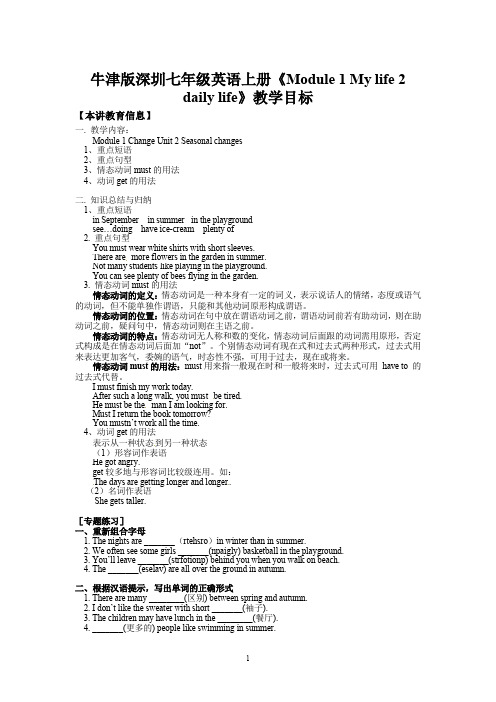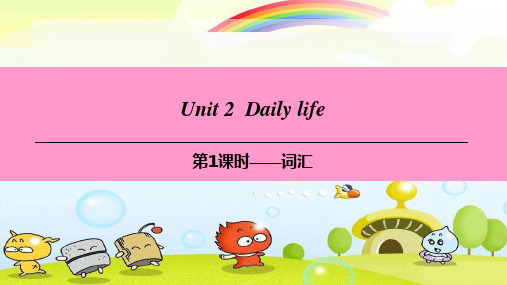牛津深圳版初中英语七年级上册Module 1 My life 2 daily lifeword教案 (5)
- 格式:doc
- 大小:105.02 KB
- 文档页数:8

牛津版深圳七年级英语上册《Module1My life2daily life》教学目标【本讲教育信息】一.教学内容:Module1Change Unit2Seasonal changes1、重点短语2、重点句型3、情态动词must的用法4、动词get的用法二.知识总结与归纳1、重点短语in September in summer in the playgroundsee…doing have ice-cream plenty of2.重点句型You must wear white shirts with short sleeves.There are more flowers in the garden in summer.Not many students like playing in the playground.You can see plenty of bees flying in the garden.3.情态动词must的用法情态动词的定义:情态动词是一种本身有一定的词义,表示说话人的情绪,态度或语气的动词,但不能单独作谓语,只能和其他动词原形构成谓语。
情态动词的位置:情态动词在句中放在谓语动词之前,谓语动词前若有助动词,则在助动词之前,疑问句中,情态动词则在主语之前。
情态动词的特点:情态动词无人称和数的变化,情态动词后面跟的动词需用原形,否定式构成是在情态动词后面加“not”。
个别情态动词有现在式和过去式两种形式,过去式用来表达更加客气,委婉的语气,时态性不强,可用于过去,现在或将来。
情态动词must的用法:must用来指一般现在时和一般将来时,过去式可用have to的过去式代替。
I must finish my work today.After such a long walk,you must be tired.He must be the man I am looking for.Must I return the book tomorrow?You mustn’t work all the time.4、动词get的用法表示从一种状态到另一种状态(1)形容词作表语He got angry.get较多地与形容词比较级连用。





深圳市初中英语目录以及语法一、七上:1,Module 1. My life Unit 1: Making friends. 1,特殊疑问句的用法2,冠词的用法Unit 2: Daily life. 一般现在时的用法2,Module 2. The natural word 句型Unit:3: The earth 1, 名词的数2, there be 句型Unit4: Seasons 形容词的用法3,Module 3. Travels Unit 5: Visiting the moon 一般将来时的用法Unit6: Travelling around Asia if引导的条件状语从句4,Module 4. Fun time Unit 7: School clubs 一般过去时Unit 8: Collecting things 人称代词与物主代词的用法。
二、七下:1,Module 1. People and places Unit 1: People around us 定冠词the 的用法Unit2: Travelling around the world. 连词and 、but和so 的用法2,Module 2. Men’s best friends Unit 3: our animal friends 1,反身代词的用法2,方位介词表示人与物的位置关系Unit 4: Save the trees 现在进行时的用法3,Module 3. Nature elements Unit 5: Water. 名词的數量,(few/little/lot of ……,how many/much)Unit 6: Electricity 情态动词must/ can/ may 4, Module 4. Colorful life Unit :7: Poem 祈使句与感叹句的用法Unit8:From hobby to career. 1, when引导的时间状语从句2,used to 表示过去时间段的用法八上:1, Module 1:amazing things Unit 1: Encyclopedias some、any 、somebody、nobody、anybody 等不定代词Unit 2: Numbers 序数词与基数词的用法2, Module 2: Science and technology Unit 3: Computers 形容词比较级与最高级的用法Unit 4: Invention 形容词比较级不规则用法,形容词原级的基本用法3, Module3;Culture and history Unit 5: Educational exchange 现在完成时的用法Unit 6: Ancient stories 现在完成时的用法4,Module4: School life Unit 7: Memory 条件状语从句(if 与unless)Unit 8: English Week 情态动词should与had better 的用法八下:1, Module 1:Social communication Unit 1: Helping those in need 动词不定式Unit 2: Body language 动名词的用法2,Module 2: Arts and crafts Unit 3: Traditional skills 被动语态Unit 4: Cartoons and comic strips 含有情态动词的被动语态与现在完成时的被动语态3, module 3: Animals Unit 5:Save the endangered animals it +is+adj+for sb to do sth/it is adj of sb to do sth Unit 6: Pets 副词的用法及构成4, module 4:Discovery Unit 7: The unknown world 原因状语的用法(as/because/because of/since/for)Unit 8: Life in the future 过去进行时九上:1, unit 1: Wise men in history. 英语常见句型:反意疑问句、疑问句、祈使句、感叹句2, unit 2: Great minds 动词不定式3, unit3: Family life 连系动词的用法4, unit4: Problems and advice 句子的成分:主谓宾、定状补5, unit 5: Action although/though 引导的让步状语从句6,unit 6: Healthy diet 宾语从句7, unit 7: The adventures of Tom Sawyer 定语从句8,unit 8: surprise endings 介词九下:1,unit 1: Great explorations 结果状语从句so/such …that,too…to等目的状语为主2,unit 2:Culture shock 状语从句以so that 、in order that 目的状语为主3, unit 3: The environment same/like/ different 及其搭配三者之间的运用4, unit 4: Natural disasters it 做形式主语的用法5,unit 5: Sports 动词的时态、语态6,unit 6: caring for your health 宾语从句。
沪教牛津版七年级上册Module 1 My lifeUnit 2 Daily life【目标】通过本单元的学习,学生的综合语言能力要达到以下语言能力目标:1.听:能听懂有关日常生活的对话或短文2.说:能够谈论自己和他人的日常生活;3读:能够阅读有关他人的日常生活的文章;4.写:能够描写自己和他人的学校生活或业余活动。
【重点单词】掌握本单元重点单词的音、形、义、性、用1.daily每日的,日常2.article文章3.never从不4.table tennis乒乓球5.ride骑,驾驶ually常地7.so因此,所以8.seldom不常,很少9.Geography地理10.break休息11.bell钟,铃12.ring(使)发出钟声,响起铃声13.end结束,终止14.band乐队15.practice练习16.together在一起17.market集市,市场18.guitar吉他19.grade年级【重点短语】掌握本单元重点短语并能熟练造句1.junior high school初级中学2.on foot步行3.take part in参加4.have a good time(= enjoy oneselfhave fun)过得愉快5.go to bed去睡觉6.get up起床7.once or twice a week每周一两次8.play the piano弹钢琴9.learn about了解10.in the morning在上午11.how long多长时间12.in the world在世界上13.from..to..从....到……14.at school在学校15.go home回家16.enjoy doing sth.喜欢做某事17.between.and.在…和…之间18.by bus乘公共汽车19.how often多久一次20.in the middle of在……中间21.at the end of在…末22.at the beginning在开头23.play table tennis打乒兵球24.play computer games玩电脑游戏25.do morning exercises做早操26.have classes上课27.a piece of一片28.have lunch吃午饭29.Help sb. with sth.帮助某人做某事30.think of...as....把…看作…【经典句型】理解本单元经典句型的句意并能就本单元话题“日常生活”熟练运用这些句型1. How long is the school lunchtime?学校的午餐时间多长?2. My school is close to my home, so I always go to school on foot.我的学校离我家很近,所以我总是步行去上学。
Unit 2 Our daily lifePeriod OneTeaching target1 Talking about cartoons.2 Talking about daily lives.3 Skimming the passage.4 Learning the new words.1. Ask students the following question:What sentence do students say most often in school?2. Give students some time to look at the cartoon . Ask them toread the three sentences in this cartoon carefully.3. QuestionWhat can we learn from this cartoon?4. Meaning of this cartoonThis cartoon is shown to tell us that something may happen bychance. The question Hi asked is an IQ one. But Lo's answer was 'Idon't know.' But it is the right answer to the question that Hiasked. So we can conclude that something may happen by chance thatwe haven't expected.And also, this cartoon is about school life. And the main passagein this Unit is also about the school life.Daily life talk1.Write 'daily life' on the board.Write 'day ' daily' as well. Ask students to guess the meaning of'daily'.Then have them work out the meaning of 'daily life'.Introducedaily / a. that happens or comes every day or once aday每日的;每天一次的Introduce: daily English, daily talk2. QuestionWhat do you usually do in your daily life?3 .Have students look at the pictures in A andask What do you know about…? Ask them to talkabout themselves with these activities by using the followingsentence patterns.I … every day.I … once/twice a week.I never …4 Invite some more able students to talk more about their dailylives.Skimming1. Review the meaning of 'skim' with students. Invite one or twostudents to tell the meaning of 'skim'.2. Ask students to look at the title, the subtitle and the pictureson page 19 inthe passage.subtitle / n. subheading副标题;小标题3. Have students finish the exercise in B Look and think.similar / a. the same in some ways but not completely thesame类似的;相似的be similar to 与…相似be different from 与…不同expect / v. think that somebody or something will come or thatsomething will happen 预料;预计4. Check the answers orally.New vocabulary items1 life / n. [Title] the way that you live生活方式e.g.an unhappy life2. whiz / n. [Subtitle] one who has remarkableskill专家;奇才;技术出众的人3. kid / n. [Subtitle] a child 小孩;孩子4 whizz-kid / n.5. [Subtitle] 1. a quite cleverchild/studen t神童;优等生 2. a clever person who moves ahead inlife very quickly领先者;弄潮儿6. top / a. highest最高的e.g.Put the book on the top shelf.Mary is the top student in our class.7. business / n. buying and selling things买卖;生意;商业Note that if we are talking about specific companies, business is acountable noun. But if we are talking about trading and makingmoney in general, business is an uncountab le noun.businessman - businessmenbusinesswoman - businesswomene.g.Sony, Ford and Coca-Cola are three big businesses.Business is very important to Hong Kong.e.g.school uniform8. manager / n. [L16] a person who controls a business, bank orhotel, etc.经理,管理人9. discuss / v. talk about something谈论;讨论;议论e.g.We must discuss the problem of old people.10. client / n. a person who pays another person,for example a lawyer or an accountant, for help oradvice客户;委托人11. simple / a. easy to do orunderstand简单的;简明的e.g.This dictionary is written in simple English.12.achieve / v. do or finish something well aftertrying hard通过努力实现;获得;实现e.g.I achieved my aim: to run one mile in under five minutes.13.grade / n. how good something is; the level ofquality of something等级;级别e.g.achieve A gradeWhich grade of petrol does your car use?14. fail /feIl/ v. not pass an exam ortest不及格;不合格fail =! pass15. exam / n. a test of what you know or cando考试e.g.fail the exampass the exam16.collect / v. go and bring somebody or something from aplace领走;接走e.g.My father collected me from school in the past.17. attend / v. go to or be at a place wheresomething is happening参加;出席e.g.Will you attend that meeting?18. continue /kEn5tInjU:/ v. [L60] 1. not stop happening or doingsomething继续做某事 2. start again afterstopping(停止后)再开始e.g.We continued working unt il 5 o'clock.Let's have lunch and continue the meeting this afternoon.Consolidation1 Copy and recite the new vocabulary items in this period.2 Scan the passage after class.Period TwoTeaching target1 Reviewing the new vocabularies2 Scanning the whole passage3 Analyzing the whole passageA small check-up1 Write out the word according to the given meaning.a) talk about somethingd__________b) not passf__________c) a quite clever childw__________d) a kind of teste__________e) highestt__________2 Choose a closest meaning to the given word.a) My father collected me from school in the past.A. took me from a personB. brought me to study and enjoyC. brought me to a placeb) Let's have lunch and continue the meeting in theafternoon.A. not stopB. start againC. havec) My sister is t he manager of this company.A. the person who takes charge of the whole companyB. the person who takes charge of buying and sellingC. the person who takes charge of moneyBackgroundThis is a magazine article about a (fictitious) girl who runs acomputer business although she is still at school. Note the firstline of the title suggests that this might be a regular article inthe magazine, featuring a different person in each issue.Reading1 Review 'scan' with students. Invite one student or two to tellthe meaning of 'scan'.2 Ask students to scan the passage silently in the class.3 Find the facts.Say: From the passage, we canfind out the times of the girl does different activities. And also,we can know a lot about her daily life. So this time, you shouldtell us something about her daily life.4 Read and thinkExplanation on the passage1 one of the top students in Guangzhouthis means that Cheng Na is a good student. But she is not thebest. She is just one of the best students in Guangzhou. So here,we use the structure - one of …e.g. Baiyun Airport is one of the biggest Airports in China.ZhongxinTower is one of the highest buildings inGuangzhou.2 all ofReview: some of, most of, many of3 in one's business4 be at schoolbe at school = study in the schoole.g.My daughter is still at school.My daughter is in the school.NB: Do these two sentences have the same meaning? Why or whynot?be at work = work in the factory5 get upget up = get out of the bed and stand upe.g.What time do you usually get up?More phrases with 'get':get on/onto: climb onto a train, bus, or bicycleget on a trainget in/into: climb into a carget into a carget off: leave a bus, train, or bicycleget off a busget out of: leave a carget our of a car6 put onput on = weare.g.Put on your coat. = Wear your coat.opposite: take offe.g.Take off your raincoat. You get the floor all wet.7 school uniforme.g. Police officers wear dark-blue uniforms.8 a family business9 start the businessmore useful phrases with 'business':a) go into businessb) it's none of your business, mind your own business: words thatyou use when you do not want to tell somebody about something thatis privatec) on business: because of your work10 t he managere.g.the general manager of the companythe director of the company11 discuss the business12 at breakfasta) = at breakf ast timee.g.We usually talk about our plan at breakfast.b) = having breakfaste.g.They are at breakfast now.we also have: at lunch/dinner/supper13work onwork on = operatee.g.work on my computer = operate my computer14go to school15 in one's own carown pron. & a.e.g.Is this your own camera or did you borrow it?I have my own room.Be careful! You cannot use 'own' after 'a' or 'the'. You cannotsay: I would like a own room. You should say: I would like my ownroom.of one’s own:e.g.I want a room of my own. = I want my own room.on ones own:e.g.She lives on her own.I can't move this case on my own.16 make a phone call to somebody= call somebody or phone somebodye.g.Yesterday I made a phone call to Mary.17 on the way to schoolon the way to + someplacee.g.on the way to workon the way to Libraryon the way to the USANB: We use ‘on the way home’. There is not a 'to' before'home'.18 achieve A grades= get/gain A grades19 in all my subjects20 fail an exampass an exam21 about twice a weekone time: oncetwo times: twicethree/four/… timese.g.once a yearWe have Christmas once a year.three times a weekMary washes her hair three times a week.…times a day/week/month/year/century …22 collect somebody from school23have lunch wi th somebodyhave breakfast/lunch/dinner with …24 return to school= go back to school25 after school = after school is overafter class is overafter work = after work is finished26 attend a club= take part in a club27 Computer Club28 ask somebody to do somethinge.g.Lily always asks me to help her with herlessons.Mum won't ask you to do the housework.Will you ask her to attend the party?29 have violin lessonshave … lessonse.g.have art and craft lessonshave PE lessonsReview the names of different lessons together with students.Chinese, English, Maths, History, Geography, Physics, Chemistry,Science, Social Study, Biology, PE, music, etc.30 take somebody home [31 in an hour or two= in one to two hourse.g.You may bring two students or three with you.I will come back in seven days or eight.32. continue doing somethinge.g.We continued working until 5 o'clock.It continued raining all afternoon.33. go to bed= go to sleepSynopsis by paragraph1 Cheng Na described her morning routine and the background to herfamily computer business.2 She is dri ven to school in her own car.3 She discribes her studies.4 At lunch time she sometimes has lunch with a businessclient.5 She describes her after-school activities.6 In the evenings she works on writing her computer games.Consolidation1 Copy the phrases.2 Copy the passage and put it into Chinese.Period ThreeTeaching target1 Introducing simple present tenseA small check-up1 Write out the following phrases.a) go to bedb] have violin lessonsc] return to schoold] after schoole] in ones own carf] at breakfastg] discuss the businessh] the manager of the companyi] achieve A degreesj] get upLanguage (1)Simple present positive1 Have students read the first sentence in the passage.I get up at six, wash and put on my school uniform. (Write on theboard)From this sentence, we learn that:She ge ts up at six, washes and puts on her school unifo rm. (Writeon the board below the first sentence)2 Say: We use verbs in the simple present tense (Write 'SimplePresent Tense' on the board) in these two sentences. But, why do w euse simple present tense here? Say: We use simple present tense to talk or write about things thathappen all the time or a number of times.Ask students to underline the first sentence on page 23 in ATalking about the present.3 Say: From these two sentences, we found that we use 'get', 'wash'and 'put' for 'I', but 'gets', 'washes' and 'puts' for 'she'.Why?4 Spelling rules:a) For I, you, we and they, we make the simple present tense fromthe infinitive of the verb.b) For he, she and it, we add s to most verbs.· I work in a shop. My brother (=he) works in a bank.· It rains a lot in London.· They live in London. Mary (=she) lives in Oxford。